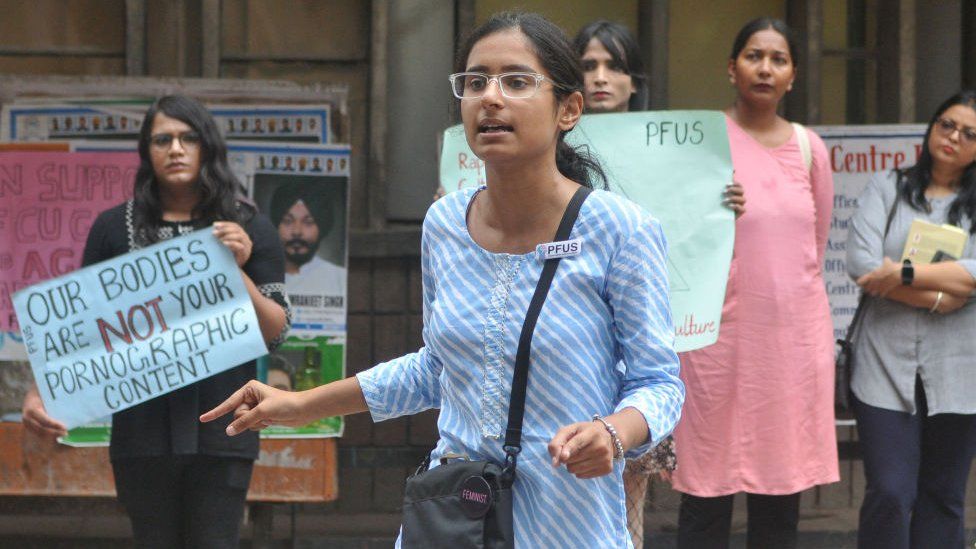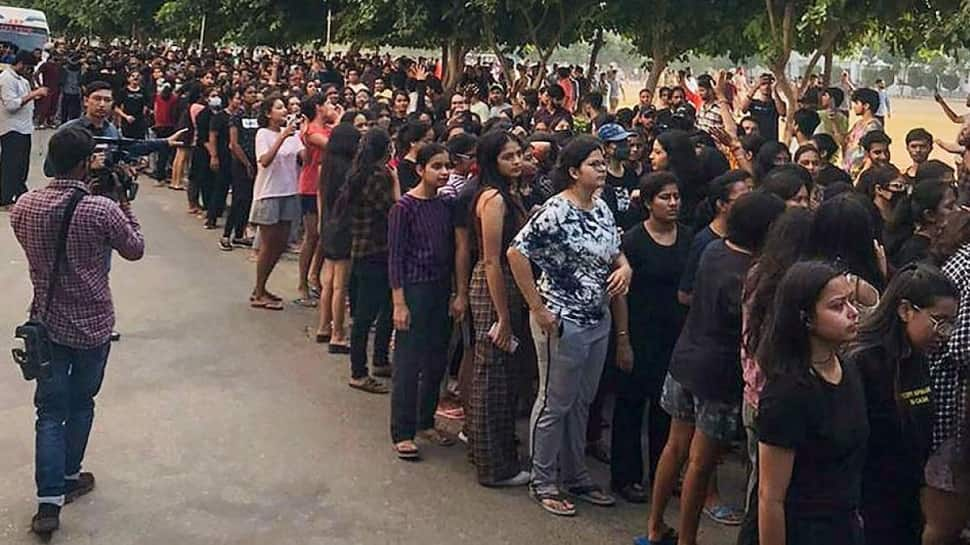Can the shadows of the past truly be erased, or do they forever linger in the digital ether? The relentless surge of Indian MMS scandals serves as a chilling reminder that the battle for privacy and digital ethics is far from over, demanding immediate and decisive action across multiple fronts.
The echoes of these scandals resonate with a particular poignancy in a nation grappling with rapid technological advancement alongside deeply ingrained social complexities. The term "MMS scandal" itself evokes a specific era, a time when the sharing of intimate content through multimedia messaging service represented a technological leap and, simultaneously, a new frontier for potential exploitation. The grainy videos, often captured with the rudimentary cameras of early mobile phones, quickly disseminated, leaving an indelible mark on those involved and igniting public outrage.
One such incident, the DPS MMS scandal of 2004, serves as a grim harbinger of the digital age's challenges. This grainy video, which circulated through the nascent digital landscape, exposed the vulnerability of individuals and the insidious power of technology to inflict lasting harm. The emergence of such scandals prompted legal, social, and technological responses. The Information Technology Act of 2000 and its subsequent amendments, notably in 2008, represented the legal system's efforts to combat the invasion of privacy and the unauthorized dissemination of intimate content. These legal measures were necessary, but it became increasingly clear that they were only one facet of a multifaceted problem.
The issue of Indian viral MMS scandals, encompassing a range of incidents from the early 2000s to the present day, underscores the urgent need for a comprehensive approach. The challenge extends beyond legal frameworks and delves into the realm of societal awareness, cultural shifts, and technological innovation. From legal interventions to technological safeguards and the promotion of digital literacy, a holistic strategy is crucial to effectively address the root causes and mitigate the repercussions of such scandals.
In the present day, the echoes of past scandals have manifested in new forms, often involving influencers and celebrities whose private lives have been laid bare on the digital stage. The rise of social media and the proliferation of smartphones have amplified the potential for privacy breaches and the unauthorized distribution of intimate content. The scandals are a reminder of the importance of exercising caution and being aware of the vulnerability of private data. The consequences for those involved extend far beyond public humiliation, often involving emotional trauma, social ostracism, and legal ramifications.
The events that unfolded at Chandigarh University in Punjab on a recent Saturday brought the issue back into sharp focus. Massive protests erupted, fueled by allegations of leaked objectionable videos of female students. The demonstrations underscored the widespread outrage, fear, and the demand for justice. The specific details of the alleged incident, including the number of videos involved, the identities of those affected, and the actions of the university administration, remain under scrutiny. The incident triggered widespread discussions across news outlets, prompting a response from both the university and law enforcement agencies.
The ripple effect of the Chandigarh University scandal is undeniable. Politicians took notice, students voiced their anguish, and the media provided extensive coverage. A student was arrested in connection with the incident, intensifying the existing emotions, and the unfolding events highlighted the pressing need for a secure campus environment that protects the privacy and dignity of its students. As the investigation progressed, the public became increasingly aware of the complexities of the matter, which sparked a broader conversation about the challenges of online privacy, gender-based violence, and the need for comprehensive measures to safeguard the rights and well-being of individuals in the digital era.
The legal system, too, played an active role in addressing the unfolding situation. The Information Technology Act of 2000, along with its subsequent amendments, serves as the primary legislative framework for dealing with cases involving the unauthorized recording and dissemination of intimate content. Law enforcement agencies are tasked with investigating the alleged crimes, collecting evidence, and prosecuting those responsible for the alleged acts. The complexities inherent in these types of investigations, which frequently involve digital forensics and the gathering of evidence from social media platforms, require specialized skills and resources.
The ripple effects of these scandals reach into other educational institutions as well. A disturbing incident at Gudlavalleru Engineering College in Andhra Pradesh revealed the presence of a hidden camera in a hostel toilet. This prompted an inquiry by the state government, emphasizing the vulnerability of female students and the imperative for heightened security protocols. The actions of those responsible for the surveillance and the subsequent dissemination of the recordings have created a sense of fear and unease on campus, emphasizing the need for urgent measures to uphold student safety.
The incident in Chittorgarh, where explicit videos allegedly involving a principal and a teacher surfaced, led to their suspension and triggered a series of investigations. This incident exemplifies the seriousness of such incidents and the need for strict disciplinary measures. This underscores the importance of maintaining ethical boundaries and ensuring that those in positions of authority adhere to the highest standards of conduct. The consequences, including job losses and reputational damage, are a reminder of the importance of professional integrity.
The case involving Prajwal Revanna, a politician whose father and grandfather are affiliated with a regional political party, brought another facet to the ongoing dialogue. Allegations of misconduct related to explicit videos have led to widespread condemnation and calls for a thorough investigation. The ensuing political controversy underscores the interconnectedness of public life and moral issues. The accusations and the subsequent investigation will significantly influence the public perception and the political landscape.
The recurrence of these scandals, encompassing incidents that span geographical locations, timeframes, and specific contexts, serves as a clarion call for increased attention and strategic action. It compels us to critically examine the underlying factors, encompassing the misuse of technology, cultural attitudes toward privacy, and the inadequacy of preventive measures. Addressing this complex issue necessitates a multi-pronged approach, encompassing legal reforms, technological innovation, societal consciousness, and cultural shifts.
The Information Technology Act of 2000, as amended in 2008, provides the legal framework for dealing with such incidents. However, there remains a need to strengthen the legislation, clarify definitions, and adapt to the rapidly evolving digital landscape. The legal system needs to improve its capability to handle digital evidence, prosecute offenders, and deliver swift and effective justice.
Technological interventions also play a crucial role in combating the spread of illegal content. Efforts to develop and implement advanced technologies such as artificial intelligence can help identify and remove offensive content from the internet. Encryption and other security measures can protect personal data and prevent unauthorized access. The collaboration between technology companies, law enforcement, and cybersecurity experts is key to effectively implementing these technological solutions.
Moreover, addressing the issue requires a societal shift. It means educating individuals about digital ethics, privacy, and the potential dangers of sharing intimate content online. The creation of a culture of consent, where respect for privacy is valued, is crucial. Open discussions about gender-based violence and online harassment can promote greater empathy and understanding. Media literacy initiatives can equip individuals with the skills to discern credible information from misinformation, ensuring informed decision-making and safe online behaviour.
The continuous unfolding of these scandals is a wake-up call. The incidents serve as a reminder of the vulnerability of privacy in the digital age. They demonstrate the urgent need for a coordinated response from all stakeholders, including government agencies, technology companies, educational institutions, and society at large. By taking effective and comprehensive steps, we can create a safer, more secure, and more ethical digital environment for everyone.
The recurring nature of these scandals highlights the importance of continuous vigilance and adaptation. By learning from past mistakes and proactively addressing present challenges, we can work together to protect individuals and uphold human rights in the digital era. The fight against MMS scandals is not just a battle for privacy; it is a struggle for a more just and equitable society. The collective commitment to fostering a secure and respectful digital world is an ongoing task that demands our unwavering dedication.


